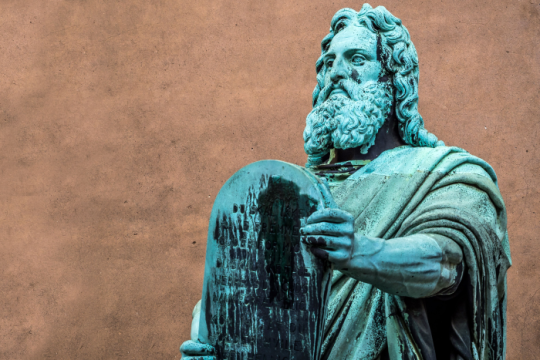Shavuot: The Day God and the Jewish People Wed

Seven weeks after the Exodus from Egypt, the Children of Israel stood at the foot of Mount Sinai and prepared to encounter God. That day, which came to be known as Shavuot, has been understood in midrash (commentary on Biblical text) as the day of the marriage between God and the Jewish people:
God proposes: “Now then, if you will obey Me faithfully and keep My covenant, you shall be My treasured possession among all the peoples” (Exodus 19:5).
The people accept: “All the people answered as one, saying, ‘All that the Eternal has spoken we will do!’” (Exodus 19:8).
The people cleanse themselves, as at a mikvah (Jewish ritual bath, traditionally used by a bride before the wedding): “Moses came down from the mountain to the people and warned the people to stay pure, and they washed their clothes” (Exodus 19:14).
Then God and the people join under a chuppah (marriage canopy): “Moses led the people out of the camp toward God, and they took their places beneath [at the foot of] the mountain. Now Mount Sinai was all in smoke, for the Eternal had come down upon it in fire” (Exodus 19:17-18).
There is a ketubah (marriage contract): “The Eternal said to Moses, “Come up to Me on the mountain and wait there, and I will give you the stone tablets with the teachings and commandments which I have inscribed to instruct them” (Exodus 24:12).
Throughout the chronologically tangled narrative, wedding metaphors abound. Moses veils his face (Exodus 34:33). God stands with Moses and reveals precious self-disclosures (Exodus 34:5-7). They each make pledges of loyalty again and again.
As to be expected in a marriage that has lasted for 3000 years, we certainly have had our ups and downs. There have been promises and infidelities, periods of intimacy and of hostility. The prophet Hosea portrays God as husband planning to take Israel to task as an unfaithful wife but then to court her anew:
Thus will I punish her
For the days of the Baalim,
On which she brought them offerings;
When, decked with earrings and jewels,
She would go after her lovers,
Forgetting Me – declares the Eternal.Assuredly, I will speak coaxingly to her
And lead her through the wilderness
And speak to her tenderly…
There she shall respond as in the days of her youth,
When she came up from the land of Egypt… (Hosea 2:15-17)
As illustrated in this piyyut (Jewish liturgical poem) by Israel Najara, a 16th-century poet, contained in Philip Goodman’s The Shavuot Anthology, the rabbis see Song of Songs as love poetry between God and the Jewish people, who seek each other through the ages. Medieval poets wrote ketubot (marriage contracts) between God and the people, to be read and reaffirmed every year on Shavuot:
This bride [Israel] consented and became [God’s] spouse. Thus an eternal covenant, binding them forever, was established between them. The Bridegroom then agreed to add to the above all future expositions of Scripture, including Sifra, Sifre, Aggadah and Tosefta [books of midrash and commentary]… The dowry that this bride brought from the house of her father consists of an understanding heart that understands, ears that hearken, and eyes that see.
Common wisdom holds that in any happy marriage, spouses choose each other again and again, reinventing themselves in relation to each other, deliberately electing to care what the other thinks and how the other feels. A good marriage involves intentionally building a story together that can be returned to – and revised together as needed.
Throughout the ages, there have been different tellings of our narrative as a people-in-relationship-with-God that we’ve needed to keep our shared tale going. As in any relationship, at times we – collectively or individually – have needed our “spouse” as a valiant protector. At other times, we’ve wanted only to be told what to do to keep things going. At our best times, we’ve counted on being in partnership with each other, with shared responsibility and mutual respect, despite our tempers and (at least on the human side) with all our flaws. It is from that position of trust and intimacy that, at a fragile time in human history, we can turn to each other for strength and to remind each other of our shared commitments: in an echo of Hosea’s words, to bind ourselves to each other in “righteousness and justice, and with goodness and mercy” and join together in support of what is true (Hosea 2:21-22). At our best, we act as each other’s hands and hearts, as seals and reminders of what love and compassion can do:
Let me be a seal upon your heart,
Like the seal upon your hand.
For love is fierce as death…
Vast floods cannot quench love,
Nor rivers drown it.
If a man offered all his wealth for love,
He would be laughed to scorn. (Song of Songs 8:6).



